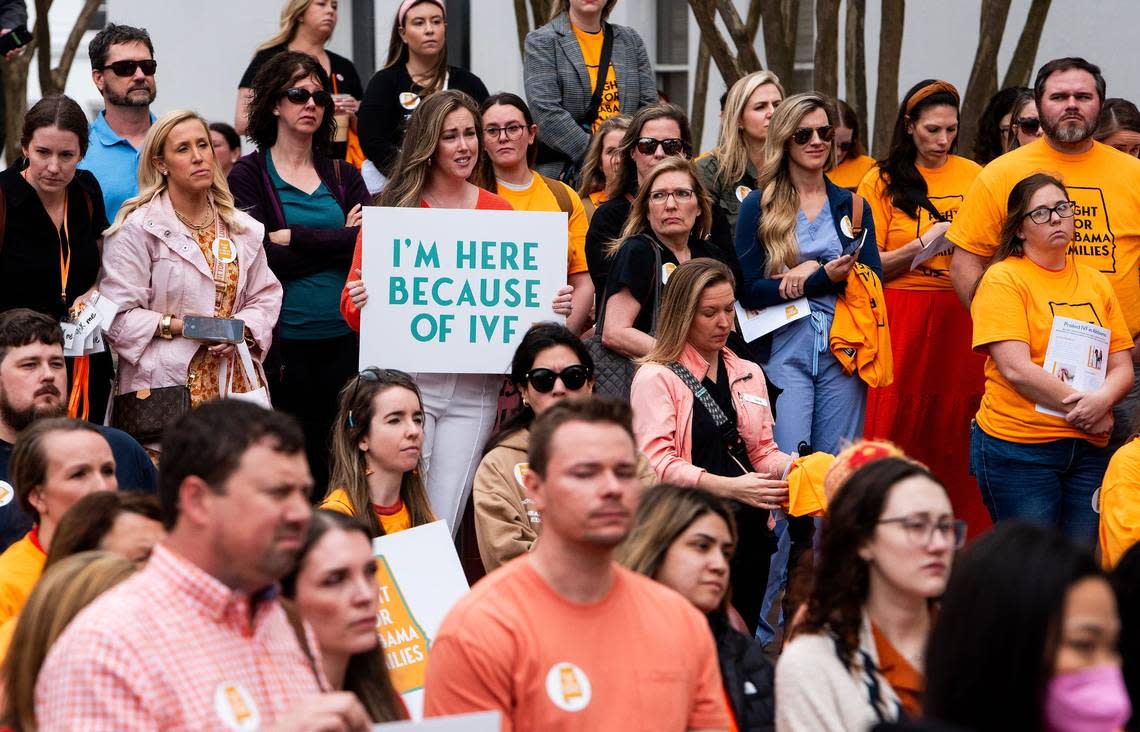Do NC Republican lawmakers support access to IVF? We asked them | Opinion

- Oops!Something went wrong.Please try again later.
After the Alabama Supreme Court issued an unprecedented ruling that threatened access to in vitro fertilization across the state, Republican lawmakers nationwide have faced scrutiny. The ruling is rooted in the belief that life begins at conception, or fertilization — something that many Republicans have long professed and even tried to codify into law at the state and federal levels.
The fallout from the ruling has been swift. Nearly all IVF treatments were abruptly halted out of caution, and the Alabama legislature quickly passed a law to protect IVF in response to the ruling. But not everyone has acted so urgently. Though parts of the GOP have scrambled to declare support for IVF, Senate Republicans also blocked a bill last week that would have established federal protections for the procedure.
Few, if any, Republicans representing North Carolina at the state and the federal levels have commented on the Alabama ruling or publicly expressed support for IVF. So I contacted them. I reached out to the offices of Lt. Gov. Mark Robinson (who is running for governor), House Speaker Tim Moore, Senate leader Phil Berger, U.S. Sens. Thom Tillis and Ted Budd and all seven Republicans representing North Carolina in the U.S. House.
This was the question I asked: Do you support access to IVF and other fertility treatments, and would you support legislative efforts to protect it?
I got just one response, and it was from Tillis. The other 11 Republicans I contacted did not respond.
“Senator Tillis is a strong supporter of protecting access to IVF and other fertility treatments, which is about creating life, not destroying it,” a spokesperson for Tillis told me. “It is hard to imagine that North Carolina or any federal court would do something that would result in a similar outcome as the Alabama Supreme Court ruling and he is glad to see the Alabama legislature is taking swift action to protect access to IVF.”
Though they didn’t respond to my inquiry, it’s worth noting that most of North Carolina’s Republican House delegation is listed as co-sponsors on a bill introduced last year titled the “Life at Conception Act.” The bill states that the term “human being” includes “all stages of life, including the moment of fertilization, cloning, or other moment at which an individual member of the human species comes into being.” Now-Sen. Ted Budd signed onto a similar bill when he was in the House. A similar bill exists on the Senate side, but that bill explicitly contains an exception that protects IVF. The House bill contains no such exception.
It’s yet another example of the tricky political landscape Republicans now must navigate in the wake of the Dobbs decision that ended Roe v. Wade — a development they long advocated for and celebrated once it occurred. But restricting access to IVF is just as — if not more — unpopular as restricting access to abortion. A new poll shows that two-thirds of Americans oppose the Alabama ruling, including nearly half of Republicans.
Tillis is not the only Republican who is willing to stand up and publicly express support for IVF — many Republicans across the country are doing the same. Of course, words aren’t the same as actions, and it’s important for those who say they support IVF to also take steps to make sure it’s protected. They should also explain how they can support IVF while als osupporting legislation that would establish that life begins at conception, potentially jeopardizing the procedure.
But it’s particularly disheartening to see North Carolina’s other leaders remain silent during an uncertain and, quite frankly, scary time for families and those trying to get pregnant. That silence says a lot about where they might stand. It also says a lot about how willing they are — or aren’t — to protect a right that feels increasingly threatened.

